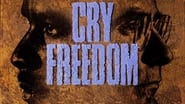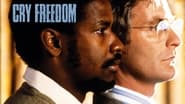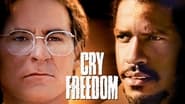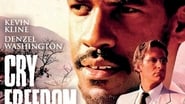Scanialara
You won't be disappointed!
Livestonth
I am only giving this movie a 1 for the great cast, though I can't imagine what any of them were thinking. This movie was horrible
ActuallyGlimmer
The best films of this genre always show a path and provide a takeaway for being a better person.
Arianna Moses
Let me be very fair here, this is not the best movie in my opinion. But, this movie is fun, it has purpose and is very enjoyable to watch.
GusF
Based on the books "Biko" and "Asking for Trouble" by its protagonist Donald Woods, this is an extremely good film which tells the story of the Daily Dispatch editor's friendship with the murdered Black Consciousness leader Steve Biko and their struggles against apartheid. Having previously taken on the British establishment in "Oh! What a Lovely War", "A Bridge Too Far" and "Gandhi", Richard Attenborough turned his attention to the far more pernicious and destructive South African establishment of the time. His direction is as assured as ever and the script by "Gandhi" screenwriter John Briley is strong but the film's second half is slightly lacking when compared to the first. While it is not the first film that I have seen dealing with apartheid, it is the first that was made while it still existed so that was very interesting. As far as I am aware, the film is very historically accurate, which I appreciated.Kevin Kline is extremely strong as Donald Woods, a liberal South African journalist who comes to Biko's attention when he accuses the Black Consciousness Movement of advocating racism. After meeting him, however, he comes to appreciate that Biko is advocating equality and, contrary to the fears of many conservative Afrikaners, has no desire to create a system in which blacks would oppress whites in the same manner as they are themselves oppressed. Like Gandhi and Martin Luther King, he advocates non-violence to achieve his political aims. Woods, who served as an adviser on the film, learns over the course of the film that the regime is even worse than he thought. After Biko is murdered, he is determined that justice be done, something which leads him to be banned and essentially placed under house arrest. The final straw comes when the Security Police sends his children T-Shirts laced with acid. He decides to leave South Africa for his and his family's safety. After 15 years, Woods returned home in 1994 to vote in the first democratic election. He died in 2001.In one of his first major film appearances, Denzel Washington is fantastic as Steve Biko, a performance which deservedly earned him a Best Supporting Actor nomination. Biko is a highly intelligent, principled and courageous man whose fierce intelligence is underestimated by the regime because of the colour of his skin. He has a perfectly logical and reasoned answer to every question whether in conversation or in court and there is nothing that he says in the film that I found any reason to disagree with even slightly. One of the best illustrations of this is when he says that a black child is doomed in live in the shanty towns on the outskirts of society irrespective of how intelligent he or she is whereas white children have considerably more opportunities. Biko is murdered about 80 minutes into the film and it is never as strong after his death. I think that it could have been better structured and included more scenes of him before he had to be killed.As is typical of Attenborough's films, the film has a very strong supporting cast, most notably Penelope Wilton as Woods' wife Wendy (though she does not have a South African accent) and Josette Simon as Dr. Mamphela Ramphele. However, I was slightly disappointed that Mamphela did not have a bigger role in the film as she seemed to be introduced with much fanfare and then simply disappeared soon after Biko's death. In real life, she was having an affair with Biko and had two children with him and a third on the way when he died but this is left out of the film, which is a shame as he could have made for an interesting subplot. As with the two "Roots" miniseries, I thought that it was a great idea to cast well known white actors with generally likable screen personas in antagonistic roles such as John Thaw as the Minister of Justice Jimmy Kruger (who died only six months before the film was released), Timothy West as Captain de Wet and Ian Richardson as the State Prosecutor. Conversely, Julian Glover is cast against his usual villainous type as Woods' friend Don Card. The film also features great appearances from Zakes Mokae (who has the largest role of any actual South African), Kevin McNally, Kate Hardie, Alec McCowen, Louis Mahoney, Joseph Marcell and Attenborough's brother-in-law Gerald Sim as the police doctor who examines the dying Biko. One actor whom I thought was conspicuous by his absence was the prominent anti-apartheid activist and playwright Athol Fugard, who previously played General Smuts in "Gandhi".At more than two and a half hours, the film is a tad too long and it focuses too much on the Woods family's escape from South Africa. While an accurate depiction of their escape and good scenes in their own right, they could have easily been shortened. After a while, it began to feel more like an adventure film and this did not fit terribly well with the rest of the film. There were also not enough scenes of the regime discriminating against black South Africans in the second half (in stark contrast to the first) for my liking. Given the time, the film was shot in Zimbabwe rather than South Africa itself and Attenborough made excellent use of that country's scenery. The Soweto massacre is depicted in flashback towards the end of the film but I felt that it would have been better to place it in its proper place chronologically speaking and to give it more prominence as the scene could have been as effective and moving as the depiction of the similar Amritsar massacre in "Gandhi".Overall, this is a very entertaining and thought provoking film but it is never as engrossing as it should be after Biko's death. It is a powerful statement against racism but it could have been even more so with slightly sharper writing.
FedRev
Cry Freedom is a film about the political awakening of white South African journalist Donald Woods after meeting black activist Stephen Biko during Apartheid in the mid-1970s. The film was produced prior to the end of Apartheid in 1994 and was based on the experiences of Woods who fled South Africa following the murder of Biko in order to publish books about the activist. Cry Freedom, along with the song "Biko" by Peter Gabriel, played a role in making Steve Biko a more widely known figure around the world, and also helped make a star of Denzel Washington, who received an Oscar nomination for his portrayal of Biko. The film is sometimes criticized as a "white savior" movie since it's primarily about Woods rather than Biko himself, but the political transformation depicted in the film is significant in its own right. Woods pursues the truth and is eventually convinced by Biko's radical argument, and as a result faced potentially severe consequences himself. Cry Freedom deserves credit for showing how systems of oppression operate, as well as for depicting the lengths people must go to in order to oppose such regimes.
MartinHafer
When this film appeared in 1987, it was considered very liberal and enlightened. However, when seen today, I could easily see someone criticizing the film for being paternalistic--and the same could be said for films like "A Dry White Season" and even the recent "Bang Bang Club" (made in South Africa itself only two years ago). After all, when Hollywood did a film about the apartheid era, it seemed to always feature a white guy in the lead and in the films, whites seemed to need to help rescue the poor, oppressed blacks--and even "Bang Bang Club" to a degree. While the stories ARE true, framing the stories these ways is a bit sad and I would love to see films that were about the black leaders in the fight for freedom. Despite this legitimate complaint, the film should not be written off, as it's an important and true story. And, for that matter, it's quite compelling.The film begins with Steven Biko (Denzel Washington) approaching the liberal white reporter, Donald Woods (Kevin Klein). While Woods thinks he's enlightened, he is a supporter of the white regime and is blind to some of the evils of apartheid. Over time, Biko is able to win over Woods--and Woods is introduced to black society within the township of Soweto. Later, after incurring the wrath of the white government, Biko is arrested and beaten to death. However, the death was written off as just some accident and Woods is determined to get out of the country and expose the brutality of the South African regime. The problem is, they are not about to just let him leave. So, Woods and his family come up with a very daring plan--a plan that takes half the film. As a sort of epilogue, the film ends with the bloody police attack on student protests in 1977--ending with over 700 children being shot to death. The ending is very fitting and quite moving.In general, I like the film. I cannot comment, however, on the accents done by Klein and Washington--I am an American who isn't attuned to such things. But, the acting is good, the film VERY compelling and it leaves you feeling raw at the end. My only complaint (other than paternalism) is the odd device of having Biko's character seeming to come to life during the film in flashback scenes or to dialog with Woods--even though he was 100% dead. Odd, that's for sure.By the way, if you are a geek (and I guess this means I am), look for Nick Tate near the very end playing a pilot. He also played a pilot on "Space: 1999"--and was a regular on the series in case his face is familiar to you.
runamokprods
In some ways it's a weaker film than "Gandhi" – a lot of the tension feels manufactured, even though the story is true. But on the other hand, the sheer emotional power of the strongest scenes, like the massacre in Soweto surpass anything in "Gandhi".While many understandably had trouble with making this the story of a white man -- liberal editor Donald Woods and his family's escape from South Africa after he was banned -- instead of focusing the film on Woods friend Stephen Biko, I still felt the film worked, and was an effective plea to the world to do something about South Africa. Both Denzel Washington and Kevin Klein are very good, although I've found both even stronger in other films.









